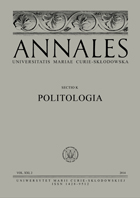Democratic Innovations and Political Participation. The Case of the
Estonian Citizens’ Assembly (Rahvakogu)
Democratic Innovations and Political Participation. The Case of the
Estonian Citizens’ Assembly (Rahvakogu)
Author(s): Dorota MajSubject(s): Governance, Government/Political systems
Published by: Wydawnictwo Naukowe Uniwersytetu Marii Curie-Sklodowskiej
Keywords: democratic innovations; deliberative democracy; representative democracy; political participation in Estonia; Estonian political system; Rahvakogu;
Summary/Abstract: The aim of this article is to examine the impact of the Estonian Citizens’ Assembly, convened in2013, on the evolution of political participation in the country. This is a significant topic, given that Estoniaoffers relatively few opportunities for participation between parliamentary elections. The article presentsa verification of the hypothesis, assuming that the Estonian Citizens’ Assembly has not resulted in notablealterations to the existing Estonian legislation, particularly with regard to the expansion of the catalogueof civic participation, both in the immediate and extended terms. The research presented in the article wasconducted through the application of the decision-making method and an analysis of legal acts. The articleis divided into three parts: the first part analyses the main issues related to the phenomenon of democraticinnovation, including definitional issues and the process of its development; the second part locates themain circumstances of the convening of the Assembly, primarily in the context of the crisis of Estonianrepresentative democracy caused by the “Silvergate” scandal. The procedure and stages of the holding ofthe Estonian Citizens’ Assembly were also presented. The third part was devoted to the results achievedand their impact on political participation in Estonia. The research findings permit the conclusion that theEstonian Citizens’ Assembly can be included in the catalogue of democratic innovations. This is due to thefact that it was an instrument for conferring a new role on citizens in the co-governance process, therebycreating new opportunities for political participation, decision-making and influence over representativedemocracy. Conversely, it is not feasible to assert that the Estonian Citizens’ Assembly has exerted a pro-found impact on the legal system, particularly in the context of introducing novel participatory instruments.
Journal: Annales Universitatis Mariae Curie-Skłodowska, sectio K – Politologia
- Issue Year: 31/2024
- Issue No: 1
- Page Range: 37-51
- Page Count: 15
- Language: English

